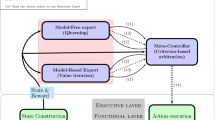Abstract
Reflexes are meant to provide animals with automatic responses for a better adaptation to their niches. In particular, humans have the capability to voluntarily modify these responses in certain situations to attain specific goals. The ability of using past experiences to tune automatic responses (reflexes) has contributed to a better adaptation to our environments and thus, the question arises of applying this to machines. In the robotic arena, imitating animal reflexes has been largely explored through fixed stimuli-behavior schemas included in reactive or hybrid architectures. In this paper we consider the less explored direction of permitting a mobile robot to modify its reflexes according to its experience, i.e. ignoring the reflex of stopping when approaching an obstacle if the robot goal is close. We explore reinforcement learning as a mechanism to automatically learn when and how modulate reflexes over the robot operational life. Advantages of our mechanism are illustrated in simulations.
Preview
Unable to display preview. Download preview PDF.
Similar content being viewed by others
References
Brooks, R.A.: A Robust Layered Control System for a Mobile Robot. IEEE J. on Robotics and Automation 2, 14–23 (1986)
Galindo, C., Gonzalez, J., Fernandez-Madrigal, J.A.: A Control Architecture for Human-Robot Integration: Application to a Robotic Wheelchair. IEEE Trans. on Systems, Man, and Cyb.–Part B 36, 1053–1068 (2006)
Prochazka, A., Clarac, F., Loeb, G., Rothwell, J., Wolpaw, J.: What do reflex and voluntary mean? Exp. Brain Res. 130, 417–432 (2000)
Benning, S.D., Patrick, C.J., Lang, A.R.: Emotional modulation of the post-auricular reflex. Psychophysiology 41, 426–432 (2004)
Cullen, K., Chen-Huang, C., McCrea, R.: Firing Behavior of Brainstem Neurons during Voluntary Cancellation of the Horizontal V-O Reflex. J. Neurophysiology 70, 844–856 (1993)
Everling, S., Dorris, M.C., Munoz, D.: Reflex suppression in the anti-saccade task is dependent on prestimulus neural processes. J. of Neurophysiology 80 (1998)
Roy, J.E., Cullen, K.E.: Vestibuloocular Reflex Signal Modulation during Voluntary and Passive Head Movements. J. of Neurophysiology 87 (2002)
Kaelbling, L.P., Littman, M.L., Moore, A.W.: Reinforcement Learning: A Survey. Journal of Artificial Intelligence Research 4, 237–277 (1996)
Murphy, R.B.: Introduction to AI Robotics. The MIT Press, Cambridge (2000)
http://www.sruweb.com/~walsh/spinal_reflex.jpg courtesy Prof. Walsh, A.A.
Even-Dar, E., Mansour, Y.: Learning Rates for Q-learning. Journal of Machine Learning Research 5, 1–25 (2003)
Author information
Authors and Affiliations
Editor information
Rights and permissions
Copyright information
© 2007 Springer Berlin Heidelberg
About this paper
Cite this paper
Galindo, C., Fernández-Madrigal, J.A., González, J. (2007). Towards the Automatic Learning of Reflex Modulation for Mobile Robot Navigation. In: Mira, J., Álvarez, J.R. (eds) Nature Inspired Problem-Solving Methods in Knowledge Engineering. IWINAC 2007. Lecture Notes in Computer Science, vol 4528. Springer, Berlin, Heidelberg. https://doi.org/10.1007/978-3-540-73055-2_37
Download citation
DOI: https://doi.org/10.1007/978-3-540-73055-2_37
Publisher Name: Springer, Berlin, Heidelberg
Print ISBN: 978-3-540-73054-5
Online ISBN: 978-3-540-73055-2
eBook Packages: Computer ScienceComputer Science (R0)




